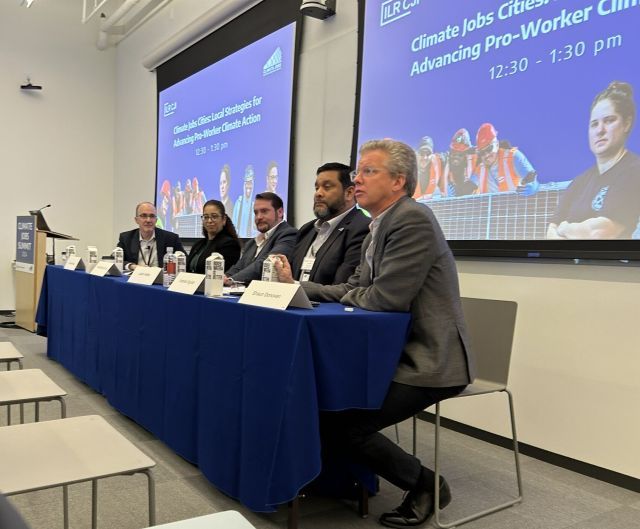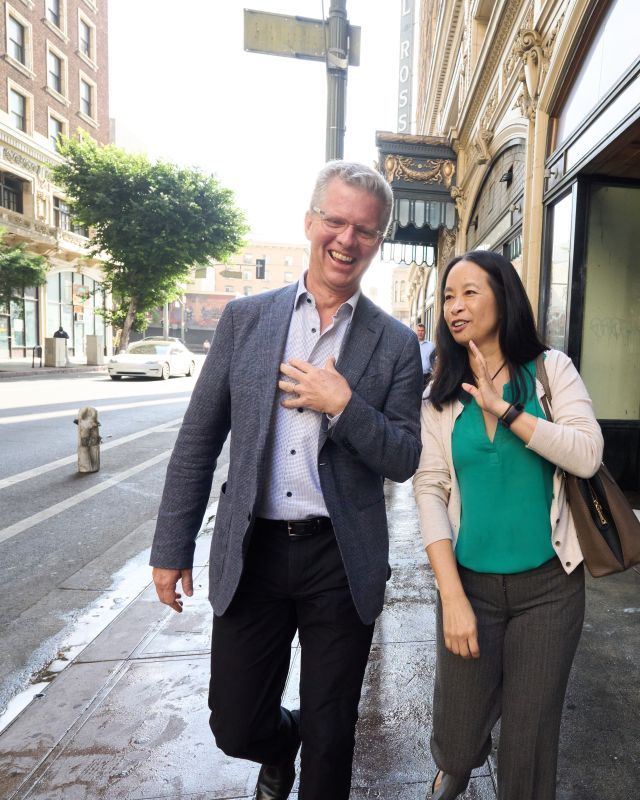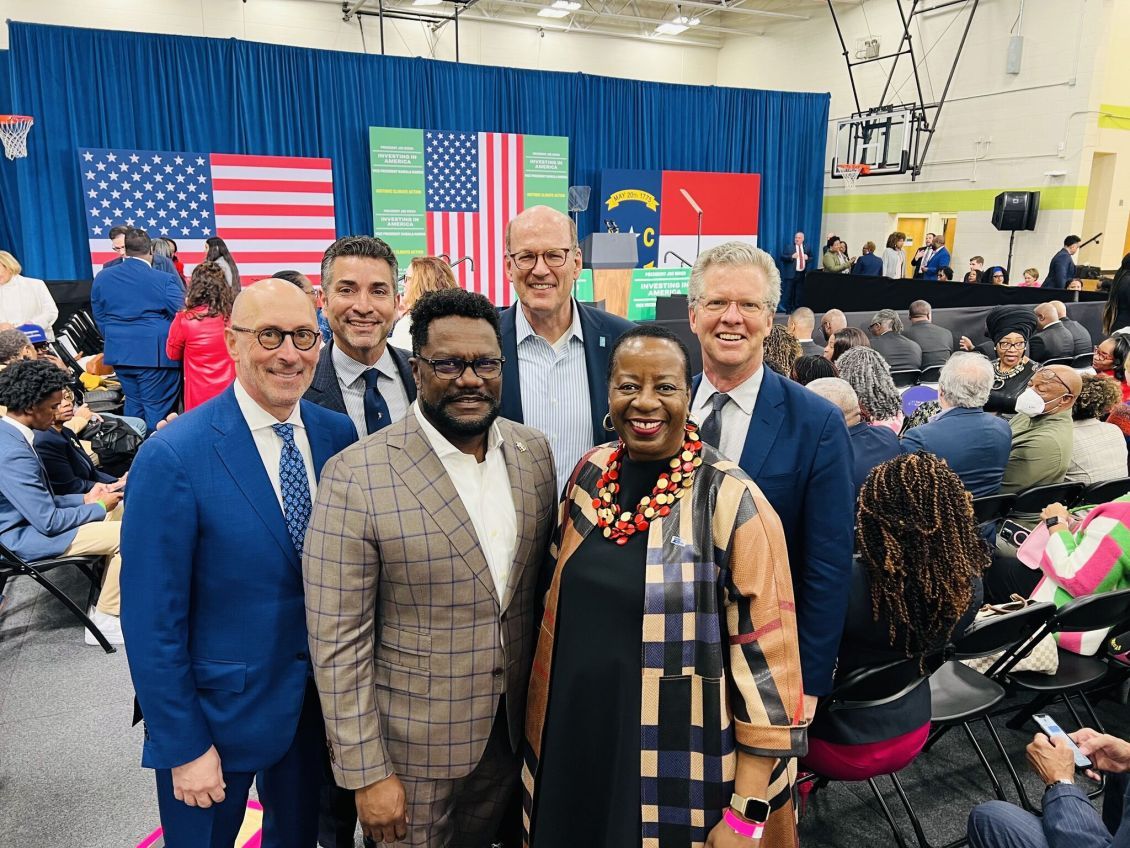On his first day at Enterprise, Shaun Donovan already had a big idea. Even as he started to unpack boxes and hang photos in his new office on that September day, he was excited about the Greenhouse Gas Reduction Fund and what he considered to be a landmark opportunity for Enterprise and for affordable housing: tapping into historic climate legislation to bring cleaner, renewable energy to thousands of homes and communities across the country. “I barely knew where the water cooler was, but I knew we had a huge opportunity and we had to act quickly,” said Donovan, Enterprise’s CEO and president.
Fast forward seven months and Enterprise is celebrating the culmination of that big idea. Power Forward Communities, a coalition Enterprise co-leads, has won a $2 billion grant from the Environmental Protection Agency’s National Clean Investment Fund. With coalition partners – Rewiring America, Habitat for Humanity International, the Local Initiatives Support Corporation (LISC), and United Way Worldwide – Enterprise will use this award to deploy a combination of financing, market building, and community engagement, all aiming to create healthier, more affordable homes.
We caught up with Donovan recently to talk about his first seven months on the job, the unprecedented Power Forward Communities award, and how homelessness is a solvable problem.
It’s big news that Power Forward Communities, a coalition Enterprise co-leads, has won a $2 billion grant from the EPA’s National Clean Investment Fund. What’s your initial reaction?
It was an incredibly exciting day to be with my fellow CEOs of the Power Forward Coalition and with Vice President Kamala Harris and EPA Administrator Mike Regan in Charlotte, North Carolina, to announce the winners. It was as exciting a room as I've ever been in.
I am also grateful to the team at Enterprise for what this means and our ability to work together to receive the largest grant in our history.
This all started on September 1st, when as a brand-new CEO, I asked this group of talented housers at Enterprise to put together the biggest application we'd ever submitted as an organization.
I was so new, yet this team put their trust in me. I am particularly grateful to them, and to everyone – every part of Enterprise contributed, and that means the impact will be unprecedented.
What’s so powerful about Enterprise's leadership here, with the coalition we've put together, is how we can turn the most historic climate legislation in the country's history into one of the most historic pieces of housing legislation in the country's history.
To that point – turning climate legislation into housing legislation – what is the significance for Enterprise?
Enterprise has always been a leader on climate – Green Communities is our flagship in the climate realm, and more than half the states around the country use it as their standard. We've become a leader on climate resilience as well. Now we can increase that leadership as we move into a new phase of the climate transition. With renewable energy costs coming down, there's the potential to reach every house, every home, and every community.
Overall, it's an enormous opportunity for us to show that Enterprise is a market maker, leading the way where there are new government resources and untested strategies.
More broadly, what are the implications for affordable housing across the country?
The potential for affordable housing is incredibly important. Our estimate is that a typical family could save $1,700 a year. And if they also purchase an electric vehicle because they've been able to get a charger in their apartment building, the savings increase to $3,000 a year for low-income families. We’ll see as much as 60% reductions in utility bills, and big increases in the amount of money a family could dedicate to food, or to send their kids to college, or other critical needs. Affordable housing is only affordable if everything you pay for at your home including rent or your mortgage, plus your utility costs, is also affordable.
We're at a moment where owners and operators of affordable housing are facing huge challenges. With a huge spike in insurance costs as well as increased costs for construction materials and staffing – everyone in affordable housing is affected. I’ve talked to leaders of our asset management teams here at Enterprise and they say this is the hardest year they've ever had in this business even though they've been at Enterprise for more than two decades.
This is a moment where we can take the biggest climate resources in our country's history and make sure that we lower the costs of operating affordable housing.
In many cases, there are local requirements to green affordable housing to provide heat pumps and other upgrades – but there hasn’t been enough money to pay for it until now. We have a real opportunity to fill gaps in affordable housing budgets to make it easier to manage and maintain affordable housing at the standard that residents deserve. Overall, it’s a huge benefit to the homes and to the communities we serve.
What would happen without these types of investments?

Without these investments, we know the truth of what happens: Wealthy communities will figure out how to put solar on their roofs, drive electric vehicles, and get heat pumps. And if low-income communities are left behind, as they so often are in our country's history, we’ll see folks left to contend with legacy fossil fuel systems.
Think about the health implications of those fossil fuel-fired power plants. We know that they're disproportionately located in low-income communities. We know that diesel trucks tend to run through low-income communities. And we know that low-income communities are more vulnerable to increasing storms and flooding and so many other impacts of climate change. We’re putting a stake down to say let’s make sure this climate transition is something that leads with low-income communities.
It’s still early on, but we’re already seeing significant interest. What do you expect will happen in the coming weeks as more people become aware of the funding opportunities?
Many people are already aware, and I see it building – $2 billion is a big deal. I’m getting calls and emails from leaders across the country and I’m sure others are also. It’s great that we’ve created resources and a website where owners of affordable housing or other local leaders – and others interested in partnering with us – can get information.
We expect to be working with the EPA through the coming few months to finalize our funding agreement and to land on a final strategy. Then, we expect to start putting money into communities and affordable housing starting in the fall. That’s when the real work begins.
You’ve been CEO at Enterprise for more than six months now. In addition to Power Forward Communities, what are you most proud of?
What’s stood out to me as I've traveled around the country is how far we have come as a unified Enterprise across our Solutions, Capital, and Community Development divisions.
I’m so proud of the way in which all 1,100 Enterprisers have come together to understand the power of this platform and the power of the ways that we can work together. One great example is the Greenhouse Gas Reduction Fund application. But if you look at how we make a different future possible for developers of color through Equitable Path Forward, that has been an effort where every part of Enterprise has contributed. If you look at the big wins that we had in the HUD and agriculture funding bills this year, these were also possible through the power of our broad platform.
Because so many people work together around the country, there are myriad ways in which we are showing what it means to be able to provide so many avenues for low-income communities and families to benefit from the work that we do, to be right on the ground and also be in the halls of Congress and at the White House and everywhere in between.
Homelessness is another issue that you have focused on for many years. We’ve seen rates rising across the country this past year. Enterprise – and you personally – have submitted amicus briefs to the Supreme Court ahead of an important case, City of Grants Pass v. Johnson. What’s the significance of this case for you and for Enterprise?
This case centers around whether you can criminalize homelessness. The question is: Are we, as a country, going to say that somebody who has no other option but to sleep in a tent, on a bench, or on the streets of cities across the country, should be ticketed or forced into dire situations as an alternative?
We’re at a moment where we have more people sleeping on our streets and in shelters than at any time in our history. Personally, it's deeply disturbing to me because I see more and more people losing hope that we can solve homelessness.

Homelessness is a solvable problem. I know that because I've seen it before, and I've been part of it. When I led the Interagency Council on Homelessness as HUD secretary, when we put together the Opening Doors plan, we dramatically reduced homelessness across the country. As a result of those efforts, we cut family homelessness and chronic homelessness by about a third. We ended veteran homelessness in more than a hundred cities and states around the country.
I know that if we take the right approaches, if we invest in the right way, if we work in partnership together in the right ways, we can reduce and even end homelessness.
Right now, we have more and more people across the country who are losing hope because they've seen the numbers growing. They've seen more and more of their neighbors on the streets. This Supreme Court case is a very visible example of a city giving up hope and basically saying the best we can do is take people off the streets and put them into prisons or other facilities as opposed to giving them housing.
For me, this is about a choice we will make as a country – are we going to sweep this under the rug? Are we just going to try and remove people from the streets, or are we really going to solve this problem, come together and provide the housing and the services that are needed to put us on a path to ending homelessness?
That’s the choice that this case puts in front of us. It puts it in front of public officials, and in front of every organization like Enterprise that has a stake in ending homelessness in this country.
We’re coming up to an event at Enterprise’s Legacy at Twin Rivers in Columbia, Maryland, where we will have the opportunity to celebrate reaching the milestone of creating and preserving one million homes. What does this milestone mean to you?
It’s often hard to grasp the magnitude of an achievement when you’re involved in efforts that unfold over decades. When you mark these big milestones, it’s a reminder to step back and really appreciate what it means. In this case, it’s looking at the length and breadth of the tradition and everything that Enterprise has been able to accomplish over its 42-year history. It’s not one person’s accomplishment – except for Jim and Patty Rouse perhaps – they get extra credit. It’s that long-term legacy over decades that’s important.
When you think about it, one million homes represent a number that is bigger than the number of homes in just about every city in this country. It’s fair to say there are very few organizations in the world that have that kind of legacy. We should celebrate it, and we should all take a moment as we celebrate at Twin Rivers to reflect on how we've been a part of that history at a scale that's almost unimaginable. While we celebrate this milestone, it’s also a good opportunity to look ahead, and to recognize we have so much more to do to address a profound shortage of affordable homes in this country.
